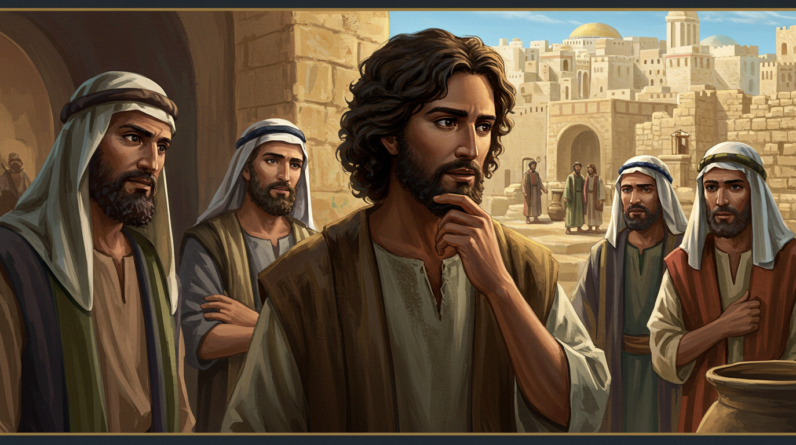Explore the pivotal tale of Matthias replacing Judas in Acts. Discover what his selection reveals about faith, community, and divine timing in early Christianity.
The Significance of Matthias Replacing Judas Iscariot in Acts
Have you ever found yourself pondering the purpose behind some of life’s more intriguing happenings? In the world of the apostles, few events might provoke such thoughts as Matthias stepping into the shoes—the sandals, if you will—of Judas Iscariot. This moment in the Book of Acts serves as an emblematic shift, a pivotal transformation that reshapes the course of early Christianity. But why Matthias? And what does his selection teach us about faith, community, and trust in divine timing? Let’s dive into this captivating tale and unravel its layers.
Who Was Matthias?
Matthias—his name might not be splashed across the Gospels with the same frequency as Peter or John, but his role carries a weight that reverberates through the ages. The name “Matthias” translates to “gift of God,” a fitting title for a man chosen to fill the gap left by Judas Iscariot. Though his hometown remains a mystery, the absence of detailed backstories like those of Peter or Matthew shouldn’t diminish the magnitude of his spiritual journey.
The first—and notably significant—mention of Matthias is found in the Book of Acts. Here, the apostles are grappling with Judas’s betrayal and subsequent demise, leaving a symbolic need to restore the number of apostles to twelve. The scriptures tell us of their collective prayer and trust that the right person would emerge to take on this vital task Acts 1:23-26.
Calling to Discipleship
Unlike some of his fellow apostles who were directly called by Jesus during His earthly ministry, Matthias’s ascension into apostleship took a divinely distinctive route. After taking the weighty step of selecting potential candidates, the remaining apostles turned to God’s guidance to fill Judas’s spot. It’s a remarkable act of faith—casting lots and praying for divine wisdom, acknowledging that human judgment alone wouldn’t suffice. Matthias’s immediate acceptance of his role speaks volumes about his readiness and devotion.
His place among the apostles wasn’t just about filling a vacancy; it was a symbolic restoration of the twelve tribes of Israel—the number twelve signifying completeness and ultimate unity in the early church. While Matthias’s presence wasn’t recorded in Jesus’ inner circle of Peter, James, and John, his story indicates the strong belief that God had orchestrated his journey from the very beginning.
Notable Events and Actions
Though Matthias doesn’t appear in many of the renowned gospel recounts, his selection as Judas’s replacement signifies a moment of deep theological importance. The apostles, having lost one of their own to betrayal and despair, showcased a profound understanding of collective discernment and faith. The casting of lots for his selection appears, at first glance, as mere chance—but under the surface, it signifies deep trust in divine providence.
Matthias’s essential strengths include a readiness to step into a key role amid uncertainty. His ability to rise to the occasion reinforces a powerful reminder that sometimes the most impactful figures are those who carry out their duties without the need for the spotlight. His acceptance without hesitation shows humility and assurance in his calling, whereas a potential struggle might have been the enormity of filling the void left by Judas.
Their Role in the Early Church
Following Jesus’ resurrection and the crucial events at Pentecost, Matthias, alongside his fellow apostles, became a vigorous proponent of the nascent church’s mission. Though the New Testament doesn’t record his specific actions, church traditions often depict Matthias as a steadfast preacher of the Gospel, dedicating his life to missionary work and bravely encountering opposition.
It’s said that Matthias traveled far, potentially reaching the corners of Ethiopia or Cappadocia, contributing in profound ways to spreading the Gospel message where it hadn’t reached before. Imagine the vigor and tenacity it must have taken—the courage to carry a message of hope across unfamiliar lands, trusting that the seeds of faith he was planting would one day grow.
How Did Matthias Die?
The accounts surrounding Matthias’s death are shrouded in mystery, much like many aspects of his life. Various traditions report different narratives, with some suggesting he was stoned to death or crucified in Ethiopia. Despite the ambiguity surrounding the exact manner, the legacy of his martyrdom speaks volumes about his unwavering commitment and dedication to his belief.
His death signifies not just the end of his earthly journey but encapsulates a profound testament of faithfulness amidst adversity. It exemplifies the power of silent heroes—those whose lives and sacrifices might not be documented in exhaustive detail but whose influence on early Christianity is indelible and profound.

Lessons We Can Learn from Matthias
What can Matthias’s journey teach us, modern-day sojourners seeking purpose and truth? From his story, we delve into the ideas of patience in divine timing, and understanding that our role in life might not always be visible yet is crucial. Matthias’s acceptance of his calling without hesitation reinforces the virtue of readiness—to be prepared in heart and spirit for when our purpose reveals itself.
We learn the importance of community, and how establishing strong spiritual ties provides support and encouragement in times of transition and challenge. Through prayer and discernment, the apostles showcased the necessity of seeking divine wisdom when faced with significant decisions—a timeless lesson for Christians navigating their spiritual journeys.
📖 Romans 8:28 encourages us that all things work together for good to those who love God, and Matthias’s story embodies this assurance, inviting us to remain open to how God can use us, even in unexpected roles.
Conclusion
Matthias, often perceived as an enigmatic figure, contributes a valuable chapter to the story of early Christianity. His selection marks a transition—a healing bridge post-betrayal and a reaffirmation of divine order. His willingness to serve, without the clamor of recognition, imparts valuable lessons of humility and trust. He embodies the essence of ancient wisdom—being more concerned with faithfulness than fame.
Acknowledgment: All Bible verses referenced in this article were accessed via Bible Gateway (or Bible Hub).







